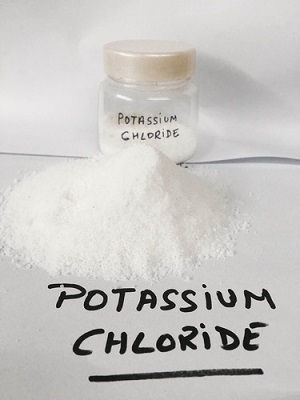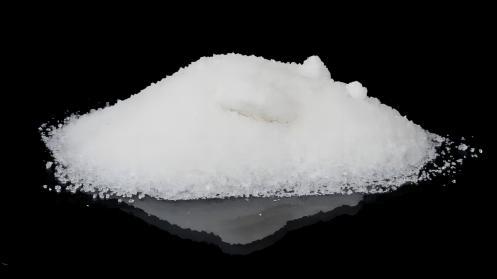What is potassium chloride?
What is potassium chloride?
Potassium is a mineral that is found in many foods and is needed for several functions of your body, especially the beating of your heart.
Potassium chloride is used to prevent or to treat low blood levels of potassium (hypokalemia).
Potassium levels can be low as a result of a disease or from taking certain medicines, or after a prolonged illness with diarrhea or vomiting.
Important information
You should not use potassium chloride if you have high levels of potassium in your blood (hyperkalemia), or if you also take a "potassium-sparing" diuretic.

To be sure potassium chloride is helping your condition, your blood may need to be tested often. Your heart rate may also be checked using an electrocardiograph or ECG (sometimes called an EKG) to measure electrical activity of the heart. This test will help your doctor determine how long to treat you with potassium. Do not miss any scheduled appointments.
Serious side effects of potassium include uneven heartbeat, muscle weakness or limp feeling, severe stomach pain, and numbness or tingling in your hands, feet, or mouth.
Do not stop taking this medicine without first talking to your doctor. If you stop taking this medicine suddenly, your condition may become worse.
Do not crush, chew, break, or suck on an extended-release tablet or capsule. Swallow the pill whole. Breaking or crushing the pill may cause too much of the drug to be released at one time. Sucking on a tablet can irritate your mouth or throat. Take potassium chloride with food or just after a meal.
Before taking this medicine
You should not use potassium chloride if you are allergic to it, or if:
you have high levels of potassium in your blood (hyperkalemia); or
you take a "potassium-sparing" diuretic (water pill) such as amiloride, spironolactone, or triamterene.
To make sure this medicine is safe for you, tell your doctor if you have ever had:
kidney disease;
cirrhosis or other liver disease;
an adrenal gland disorder;
a large tissue injury such as a severe burn;
severe dehydration;
diabetes;
heart disease or high blood pressure;
stomach or intestinal bleeding;
a blockage in your stomach or intestines; or
chronic diarrhea (such as ulcerative colitis, Crohn's disease).
It is not known whether this medicine will harm an unborn baby. Your dose needs may be different during pregnancy. Tell your doctor if you are pregnant or breast-feeding.
How should I take potassium chloride?
Take potassium chloride exactly as prescribed by your doctor. Follow all directions on your prescription label and read all medication guides or instruction sheets. Your doctor may occasionally change your dose.
Read and carefully follow any Instructions for Use provided with your medicine. Ask your doctor or pharmacist if you do not understand these instructions.
Take potassium chloride with a full glass of water. Take the medicine with food or just after a meal.
Measure liquid medicine with the dosing syringe provided, or with a special dose-measuring spoon or medicine cup. If you do not have a dose-measuring device, ask your pharmacist for one.
Do not crush, chew, or suck on a tablet or capsule. Sucking on the pill could irritate your mouth or throat.
Call your doctor if you have trouble swallowing a potassium chloride capsule or tablet. You may be able to dissolve the tablet in water, or mix the medicine from a capsule with soft food. Carefully follow your doctor's instructions.
Mix the powder form of this medicine with at least 4 ounces (one-half cup) of cold water or fruit juice before taking. Drink the mixture slowly, over 5 to 10 minutes in all. To make sure you get the entire dose, add a little more water to the same glass, swirl gently and drink right away.
To be sure this medicine is helping your condition, you may need frequent blood tests. You may not notice any change in your symptoms, but your blood work will help your doctor determine how long to treat you with potassium chloride. Your heart function may need to be checked using an electrocardiograph or ECG (sometimes called an EKG). Even if you have no symptoms, tests can help your doctor determine if this medicine is effective.
Your treatment may include a special diet. Follow the diet plan created for you by your doctor or nutrition counselor. Get familiar with the list of foods you should eat or avoid to help control your condition.
Potassium-rich foods include: squash, baked potatoes (skin on), spinach, lentils, broccoli, Brussels sprouts, zucchini, kidney or navy beans, raisins, watermelon, orange juice, bananas, cantaloupe, and low-fat milk or yogurt. Consume only the daily amounts recommended by your doctor or nutrition counselor.
Some tablets are made with a shell that is not absorbed or melted in the body. Part of this shell may appear in your stool. This is normal and will not make the medicine less effective.
Store at room temperature away from moisture and heat. Keep the medication in a closed container.
What happens if I miss a dose?
Take the missed dose as soon as you remember. Skip the missed dose if it is almost time for your next scheduled dose. Do not take extra medicine to make up the missed dose.
What happens if I overdose?
Seek emergency medical attention or call the Poison Help line at 1-800-222-1222.
Overdose symptoms may include irregular heartbeats, chest pain, or muscle weakness.
What should I avoid while taking potassium chloride?
Avoid taking supplements or using other products that contain potassium without first asking your doctor. Salt substitutes or low-salt dietary products often contain potassium. If you take certain products together you may accidentally get too much potassium. Read the label of any other medicine you are using to see if it contains potassium
Related articles And Qustion
See also
Lastest Price from Potassium chloride manufacturers

US $1200.00-1100.00/ton2025-09-22
- CAS:
- 7447-40-7
- Min. Order:
- 1ton
- Purity:
- 99%
- Supply Ability:
- 1000T/M

US $10.00/kg2025-04-21
- CAS:
- 7447-40-7
- Min. Order:
- 1kg
- Purity:
- 99.5%
- Supply Ability:
- 100




